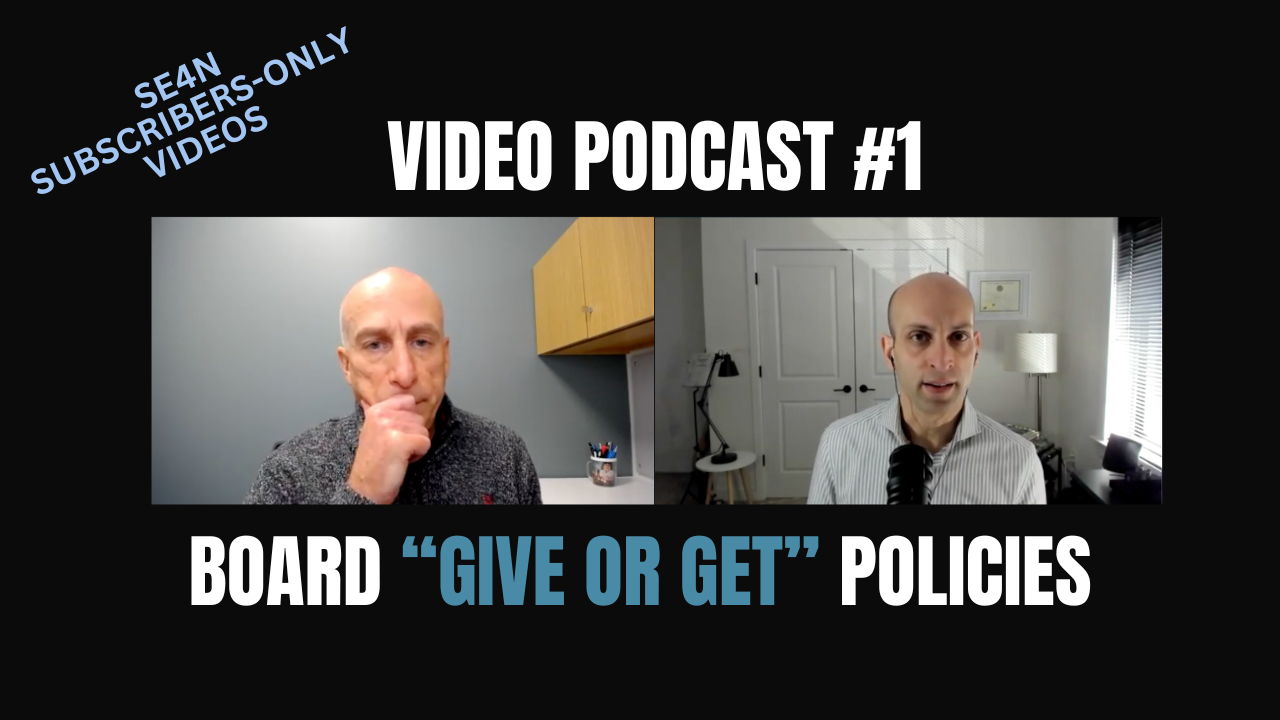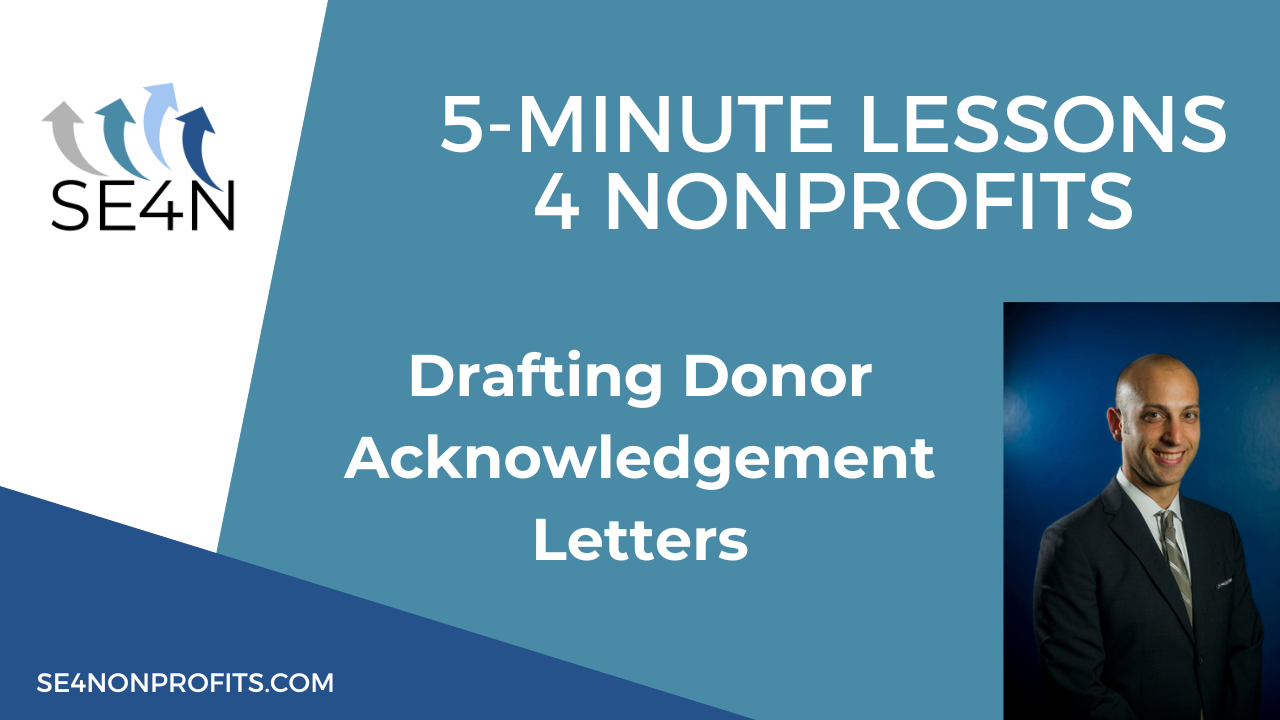
Blog.
Most Recent Posts

VIDEO Q&A for Subscribers: July 2025
Ben and Mike answer questions from subscribers about what to do when a capital campaign falls short of its goal, whether a 501(c)(3) organization can have only one Board member, getting back into compliance with the organization's investment policy, and whether unpaid internships raise conflict of interest issues.

VIDEO Q&A for Subscribers: June 2025
Ben and Mike answer questions from subscribers about preparing to serve on a nonprofit Board of Directors, the pros and cons of group exemptions, mitigating auditor concerns about pledges receivable, and whether the rationale for a Board member's dissenting vote should be included in Board meeting minutes.
![TEMPLATE: Short and Basic Grant Agreement [SUBSCRIBERS-ONLY]](https://images.squarespace-cdn.com/content/v1/5e6ccadfb4659c1d51df14d5/bc1462e3-deda-4cdc-a0c7-3edc747b5b6f/pexels-karolina-grabowska-4750274.jpg)
TEMPLATE: Short and Basic Grant Agreement [SUBSCRIBERS-ONLY]
This short and basic grant agreement template is intended for situations involving relatively straightforward grants from one 501(c)(3) organization to another 501(c)(3) organization to fund a specific project or program. This sample document provides relatively concise language covering key terms such as the timing of grant payments, the allowable use of grant funds, reporting and recordkeeping requirements imposed on the recipient organization, and more.

Q&A #162 – Can nonprofit volunteers deduct the value of their services as a charitable contribution?
The value of a volunteer’s time for in-kind services donated to a nonprofit organization is not tax deductible, and an organization should never state the dollar value of a volunteer’s services in an acknowledgment letter. However, it may be appropriate to provide volunteers with an acknowledgment letter that generally describes the services they provided so that volunteers can deduct certain eligible unreimbursed expenses.
![Watching Over Pledges Receivable During Periods of Change and Uncertainty [SUBSCRIBERS-ONLY]](https://images.squarespace-cdn.com/content/v1/5e6ccadfb4659c1d51df14d5/1709998726211-M7RPVKBN39H47RUV4BBW/pexels-cottonbro-studio-5909800.jpg)
Watching Over Pledges Receivable During Periods of Change and Uncertainty [SUBSCRIBERS-ONLY]
Pledges receivable are a vital asset on a nonprofit organization’s balance sheet. However, this asset is highly sensitive to changing economic conditions and donor sentiment. Understanding how past management actions have impacted pledges receivable, and learning to adopt new management tactics, is vital to protecting current pledges receivable and attracting new pledges.
![TEMPLATE: Donor Acknowledgement Letters [SUBSCRIBERS-ONLY]](https://images.squarespace-cdn.com/content/v1/5e6ccadfb4659c1d51df14d5/f328f5a7-6c2b-4973-a39b-d3f8e02bb557/mediamodifier-S3Lig53867M-unsplash.jpg)
TEMPLATE: Donor Acknowledgement Letters [SUBSCRIBERS-ONLY]
These donor acknowledgment letter templates provides sample language that generally satisfies basic IRS requirements for the most common donation scenarios, including cash contributions, non-cash contributions, as well as cash and non-cash gifts that are treated as quid pro quo contributions.

VIDEO PODCAST: The Downsides of Board “Give or Get” Policies
Mike and Ben discuss Board giving policies, including why nonprofit organizations have them, the components of a formal Board giving policy, and the often overlooked complications and negative consequences of Board giving policies with a "give or get" option.

The Case Against Board “Give or Get” Policies for a Nonprofit Organization
For nonprofit organizations, especially public charities, individual Board member giving is almost always a sensitive subject. Board giving is usually an important benchmark for nonprofits and frequently is treated as a “badge of honor” when an organization can report that 100% of its Board members have made an annual contribution. Board “give or get” policies may help some organizations reach Board giving goals, but they are complex and often hard to enforce, quantify, and manage.

VIDEO: Drafting Donor Acknowledgment Letters | 5-Minute Lessons 4 Nonprofits
SE4N's Benjamin Takis provides a short lesson on what to include in donor acknowledgment letters, what NOT to include, how to handle quid pro quo contributions, and more.
![Regular Communication Between Development and Finance Departments is Essential for Donor Management [SUBSCRIBERS-ONLY]](https://images.squarespace-cdn.com/content/v1/5e6ccadfb4659c1d51df14d5/1708829199672-XQNOJI61DNDSNNBFEDCL/pexels-alex-andrews-821754.jpg)
Regular Communication Between Development and Finance Departments is Essential for Donor Management [SUBSCRIBERS-ONLY]
Donors are one of the most precious sources of funding for publicly supported nonprofit organizations. Managing this resource is critical to sustainability, continuity, and financial health. There are many important elements to donor management, but these elements will be rendered almost useless without consistent pathways of communication and sharing of information between development and finance departments.

Q&A #144 – What is the year-end charitable deduction deadline for donations made via credit card?
According to Internal Revenue Service guidance, donations made via credit card are eligible for the charitable deduction in the year in which the charge is made on the donor’s credit card, regardless of when the donor pays the credit bill or when the nonprofit ultimately receives the funds. See IRS Revenue Ruling 78-38 and Publication 526.
![Improving Pledge Collections Through Active Communication [SUBSCRIBERS-ONLY]](https://images.squarespace-cdn.com/content/v1/5e6ccadfb4659c1d51df14d5/1709040185198-34WBKMC7ETOQ7QPOE8G6/coins-2825094_1920.jpg)
Improving Pledge Collections Through Active Communication [SUBSCRIBERS-ONLY]
Time can get away from us quickly. This is especially true when it comes to pledges receivable. Nonprofit organizations invest a lot of time and effort in acquiring new pledges. In the rush to bring in new pledges, we sometimes relegate oversight of existing pledges to the back burner. Pledges will be less impactful if collection performance is poor. The key to success is to be thoughtful with management of pledge collections and maintain active and fresh communication with existing pledgors.
![Matching Gifts Bring Financial Opportunities and Planning Challenges [SUBSCRIBERS-ONLY]](https://images.squarespace-cdn.com/content/v1/5e6ccadfb4659c1d51df14d5/1709990464828-JTVQPPGRK03F7M2HZEWH/drop-545377_1920.jpg)
Matching Gifts Bring Financial Opportunities and Planning Challenges [SUBSCRIBERS-ONLY]
New significant contributions with matching gift components can be a game-changer for nonprofit organizations. However, do not let a potential financial windfall cloud your judgment and decision-making. A matching gift that is not completely understood and optimized will lead to missed opportunities and even to possible negative consequences.

Q&A #40 – How should nonprofits acknowledge donation checks received after December 31?
The short answer is that donors are permitted to treat a charitable contribution as made on the date it is placed in the mail via U.S. Postal Service, even if the check is not delivered or cashed until the following year, see Treas. Reg. § 1.170A-1(b). While it is not the charity’s responsibility to establish the date of delivery in the acknowledgement letter, you want to be as helpful as you can be to your donors. This can lead to some tricky situations.
![Strategies to Keep Board Members on Track with their Commitments [SUBSCRIBERS-ONLY]](https://images.squarespace-cdn.com/content/v1/5e6ccadfb4659c1d51df14d5/1708200617091-DK4DWQU4IP8UL8CIJF0Q/rails-3309912_1920.jpg)
Strategies to Keep Board Members on Track with their Commitments [SUBSCRIBERS-ONLY]
Getting Board members to follow through on their commitments of time and money to the nonprofits they serve can be very challenging. Often, we let our emotions rule, getting frustrated and blaming the Board members for lack of engagement. This is misguided. We need to work harder to help Board members engage at higher levels.